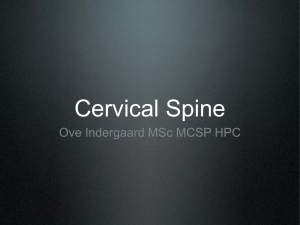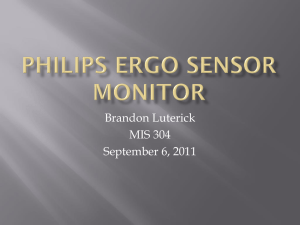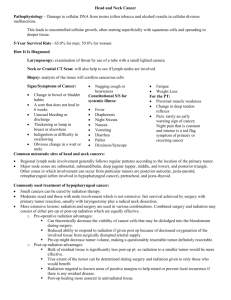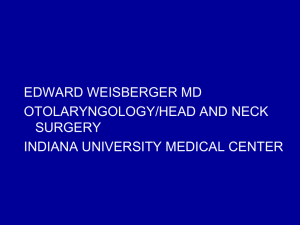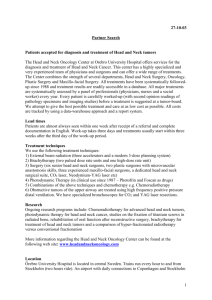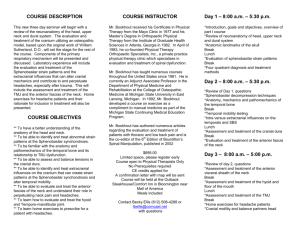Senior - UCSF Radiation Oncology
advertisement
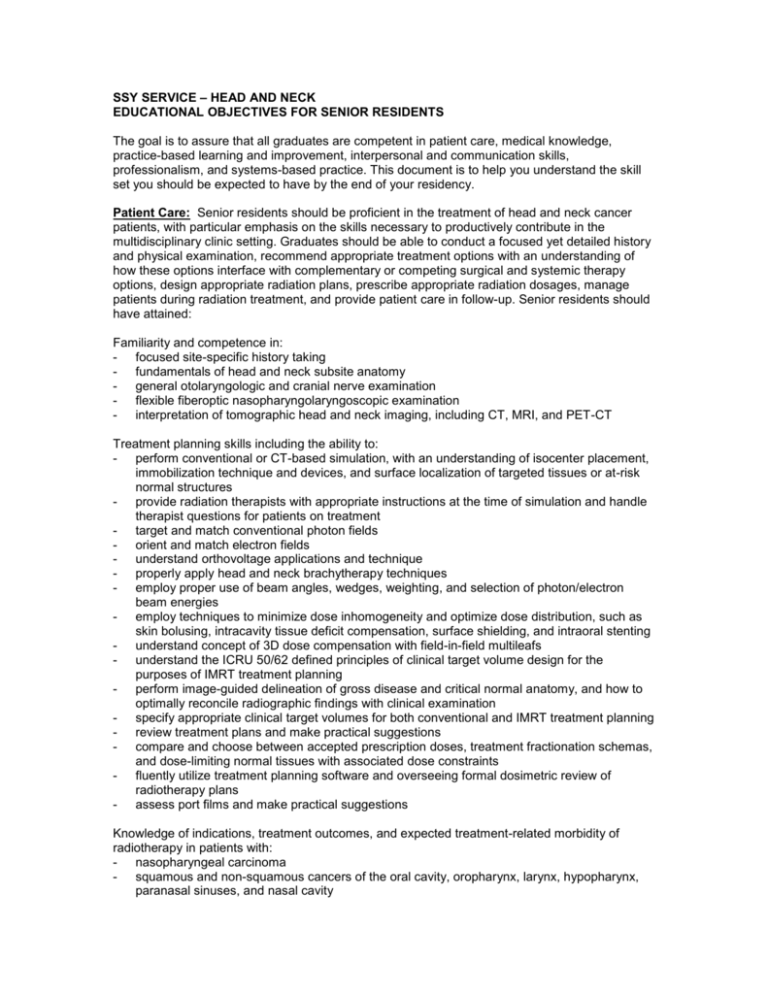
SSY SERVICE – HEAD AND NECK EDUCATIONAL OBJECTIVES FOR SENIOR RESIDENTS The goal is to assure that all graduates are competent in patient care, medical knowledge, practice-based learning and improvement, interpersonal and communication skills, professionalism, and systems-based practice. This document is to help you understand the skill set you should be expected to have by the end of your residency. Patient Care: Senior residents should be proficient in the treatment of head and neck cancer patients, with particular emphasis on the skills necessary to productively contribute in the multidisciplinary clinic setting. Graduates should be able to conduct a focused yet detailed history and physical examination, recommend appropriate treatment options with an understanding of how these options interface with complementary or competing surgical and systemic therapy options, design appropriate radiation plans, prescribe appropriate radiation dosages, manage patients during radiation treatment, and provide patient care in follow-up. Senior residents should have attained: Familiarity and competence in: - focused site-specific history taking - fundamentals of head and neck subsite anatomy - general otolaryngologic and cranial nerve examination - flexible fiberoptic nasopharyngolaryngoscopic examination - interpretation of tomographic head and neck imaging, including CT, MRI, and PET-CT Treatment planning skills including the ability to: - perform conventional or CT-based simulation, with an understanding of isocenter placement, immobilization technique and devices, and surface localization of targeted tissues or at-risk normal structures - provide radiation therapists with appropriate instructions at the time of simulation and handle therapist questions for patients on treatment - target and match conventional photon fields - orient and match electron fields - understand orthovoltage applications and technique - properly apply head and neck brachytherapy techniques - employ proper use of beam angles, wedges, weighting, and selection of photon/electron beam energies - employ techniques to minimize dose inhomogeneity and optimize dose distribution, such as skin bolusing, intracavity tissue deficit compensation, surface shielding, and intraoral stenting - understand concept of 3D dose compensation with field-in-field multileafs - understand the ICRU 50/62 defined principles of clinical target volume design for the purposes of IMRT treatment planning - perform image-guided delineation of gross disease and critical normal anatomy, and how to optimally reconcile radiographic findings with clinical examination - specify appropriate clinical target volumes for both conventional and IMRT treatment planning - review treatment plans and make practical suggestions - compare and choose between accepted prescription doses, treatment fractionation schemas, and dose-limiting normal tissues with associated dose constraints - fluently utilize treatment planning software and overseeing formal dosimetric review of radiotherapy plans - assess port films and make practical suggestions Knowledge of indications, treatment outcomes, and expected treatment-related morbidity of radiotherapy in patients with: - nasopharyngeal carcinoma - squamous and non-squamous cancers of the oral cavity, oropharynx, larynx, hypopharynx, paranasal sinuses, and nasal cavity - non-melanoma skin cancers of the head and neck melanoma of the head and neck major and minor salivary gland neoplasms advanced thyroid gland neoplasms mesenchymal disease of the head and neck orbit and ear-related malignancies neurogenic neoplasms of the head and neck, including paragangliomas locoregionally recurrent head and neck cancer advanced de novo head and neck disease or metastatic disease to the head and neck region requiring palliation Familiarity with the National Comprehensive Cancer Network stage and site-specific practice guidelines for head and neck cancers Knowledge of indications for surgery including effort to: - become fluent in treatment outcomes and expected morbidity for surgery - develop familiarity with historical and current strategies to combine surgery and radiation - develop familiarity with modern surgical techniques, including organ sparing approaches, free tissue transfer reconstruction, and function sparing neck dissection strategies Knowledge of indications for systemic therapy for the above conditions including effort to: - become fluent in treatment outcomes and expected morbidity for chemotherapy and current biological therapy approaches - develop familiarity with historical and current strategies to combine systemic therapy and radiation, including induction and concurrent radiosensitizing regimens - develop knowledge for palliative management with systemic therapy, including experimental approaches under study Knowledge of the indicated roles of allied clinical services for optimizing supportive management of the above conditions including: - familiarity with the perspective, techniques, and head and neck cancer-specific services offered by the Speech Pathology, Audiology, Oral Medicine, Interventional Radiology, Nutrition, Smoking Cessation, Pain Management, Psychiatry, and Patient Advocacy services Competency in the multidisciplinary setting via: - effective and collegial communication with referring physicians and other allied providers - articulation of clinical literature in a tumor board setting - comprehensive oversight of supportive patient care during the course of radiotherapy - emphasis on compassionate, independent interaction with patients and their families - initiative to actively manage treatment during all of its phases of delivery Medical Knowledge: Senior residents are required to gain a full understanding of head and neck cancer and the role radiation plays in the management of this disease. Critical review of historical and current head and neck cancer literature will be emphasized. The specific requirements for medical knowledge are outlined below. Understand - head and neck epidemiology and mortality rates - proper initial work-up and AJCC-defined staging - head and neck subsite anatomy, including cranial nerve anatomy - fundamentals of molecular etiology and pathophysiology of disease - physiologic and functional consequences of both disease and treatment - head and neck imaging techniques, including tomographic imaging and ultrasound - multidisciplinary treatment formulation and expected outcomes, as described above - recommended post-treatment surveillance approaches - detailed technical issues behind the design of complex IMRT-based treatment - detailed technical issues behind the design of complex electron beam treatment detailed technical issues behind the design of complex orthovoltage treatment head and neck brachytherapy indications and techniques Practice-based learning and improvement: Senior residents are taught to practice evidencebased medicine through clinical and literature review as well as the National Comprehensive Cancer Network practice guidelines. Interpersonal and Communication Skills: Senior residents are required to develop effective communication skills in patient care management, communication with other physicians, midlevel providers, and nurses. Communication skills are taught through resident participation in didactic lectures (both departmental and institutional) and during visiting professor sessions. Professionalism: Every resident completes mandatory computer-based training in ethics and discrimination and work place professionalism. System-Based Practice: Individual faculty members teach system-based practice issues. Didactic lectures concerning system-based practice are also provided by visiting professorships and discussion at departmental meetings. SSY SERVICE – THORACIC EDUCATIONAL OBJECTIVES FOR SENIOR RESIDENTS The goal is to assure that all graduates are competent in patient care, medical knowledge, practice-based learning and improvement, interpersonal and communication skills, professionalism, and systems-based practice. This document is to help you understand the skill set you should be expected to have by the end of your residency. Patient Care: Senior residents should be proficient in the treatment of thoracic cancer patients, with particular emphasis on the skills necessary to productively contribute in the multidisciplinary clinic setting. Graduates should be able to conduct a focused yet detailed history and physical examination, recommend appropriate treatment options with an understanding of how these options interface with complementary or competing surgical and systemic therapy options, design appropriate radiation plans, prescribe appropriate radiation dosages, manage patients during radiation treatment, and provide patient care in follow-up. Senior residents should have attained: Familiarity and competence in: - focused site-specific history taking - fundamentals of thoracic subsite anatomy - general chest wall and lung examination - understanding of bronchoscopic and endoscopic examination - interpretation of pertinent imaging, including dedicated chest CT, MRI, PET-CT, and other nuclear medicine studies Treatment planning skills including the ability to: - perform conventional or CT-based simulation, with an understanding of isocenter placement, immobilization technique and devices, and surface localization of targeted tissues or at-risk normal structures - properly implement 4D CT simulation and other techniques for motion correction in radiation planning and delivery - provide radiation therapists with appropriate instructions at the time of simulation and handle therapist questions for patients on treatment - target and match conventional photon fields - orient and match electron fields - apply endobronchial and esophageal brachytherapy techniques - properly use beam angles, wedges, weighting, and selection of photon/electron beam energies - employ techniques to minimize dose inhomogeneity and optimize dose distribution, such as heterogeneity corrections, tissue compensation, and internal target volume creation - compare and prescribe linac-based and CyberKnife stereotactic body radiation therapy - use 3D dose compensation with field-in-field multileafs - implement ICRU 50/62 defined principles of clinical target volume design for the purposes of IMRT treatment planning - utilize image-guided delineation of gross disease and critical normal anatomy, and how to optimally reconcile radiographic findings with clinical examination - specify appropriate clinical target volumes for stereotactic, conventional, and IMRT treatment planning - review treatment plans and make practical suggestions - compare and choose between accepted prescription doses, treatment fractionation schemas, and dose-limiting normal tissues with associated dose constraints for hypofractionated and conventionally fractionated treatment plans - fluently utilize treatment planning software and overseeing formal dosimetric review of radiotherapy plans - assess port films and make practical suggestions Knowledge of indications, treatment outcomes, and expected treatment-related morbidity of radiotherapy in patients with: - early-stage non-small cell lung cancer - advanced-stage non-small cell lung cancer - limited- and advanced-stage small cell lung cancer - thymic tumors and malignancies - chest wall and intrathoracic sarcoma - mesothelioma - carcinoid and neuroendocrine tumors - malignancies of the esophagus and gastroesophageal junction - locoregionally recurrent thoracic tumors - metastatic disease to the lungs or brain requiring palliation Familiarity with the National Comprehensive Cancer Network stage and site-specific practice guidelines for thoracic malignancies Knowledge of indications for surgery including effort to: - become fluent in treatment outcomes and expected morbidity for surgery - develop familiarity with historical and current strategies to combine radiation with surgery - develop familiarity with modern surgical techniques, including principles of anatomic resection, strategies for regional disease assessment, and video-assisted and rib-sparing approaches Knowledge of indications for systemic therapy for the above conditions including effort to: - become fluent in treatment outcomes and expected morbidity for chemotherapy and current biological therapy approaches - develop familiarity with historical and current strategies to combine systemic therapy with surgery and/or radiation, including induction, adjuvant, and radiosensitizing regimens - develop knowledge for palliative management with systemic therapy, including experimental approaches under study Knowledge of the indicated roles of allied clinical services for optimizing supportive management of the above conditions including: - familiarity with the perspective, techniques, and cancer-specific services offered by the Pulmonary Medicine, Interventional Radiology, Pain Management, Palliative Care, Symptom Management, Smoking Cessation, and Patient Advocacy services Competency in the multidisciplinary setting via: - effective and collegial communication with referring physicians and other allied providers - articulation of clinical literature in a tumor board setting - comprehensive oversight of supportive patient care during the course of radiotherapy - emphasis on compassionate, independent interaction with patients and their families - initiative to actively manage treatment during all of its phases of delivery Medical Knowledge: Senior residents are required to gain a full understanding of thoracic cancers and the role radiation plays in the management of these diseases. Critical review of historical and current thoracic cancer literature will be emphasized. The specific requirements for medical knowledge are outlined below. Understand - lung cancer epidemiology and mortality rates - proper initial work-up and AJCC-defined staging - thoracic subsite anatomy, including nodal anatomy - fundamentals of molecular etiology and pathophysiology of disease - physiologic and functional consequences of both disease and treatment - thoracic imaging techniques, including 3D and 4D tomographic imaging and PET - multidisciplinary treatment formulation and expected outcomes, as described above - recommended post-treatment surveillance approaches detailed technical issues behind the design of stereotactic body radiotherapy detailed technical issues behind the design of complex 3D- or IMRT-based treatment detailed technical issues behind the design of complex electron beam treatment endobronchial or esophageal brachytherapy indications and techniques Practice-based learning and improvement: Senior residents are taught to practice evidencebased medicine through clinical and literature review as well as the National Comprehensive Cancer Network practice guidelines. Interpersonal and Communication Skills: Senior residents are required to develop effective communication skills in patient care management, communication with other physicians, midlevel providers, and nurses. Communication skills are taught through resident participation in didactic lectures (both departmental and institutional) and during visiting professor sessions. Professionalism: Every resident completes mandatory computer-based training in ethics and discrimination and work place professionalism. System-Based Practice: Individual faculty members teach system-based practice issues. Didactic lectures concerning system-based practice are also provided by visiting professorships and discussion at departmental meetings.
